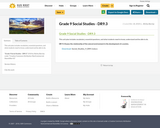
This unit plan includes vocabulary, essential questions, and what students need to know, understand and be able to do.
- Subject:
- Social Studies
- Material Type:
- Unit of Study
- Date Added:
- 10/18/2018

This unit plan includes vocabulary, essential questions, and what students need to know, understand and be able to do.
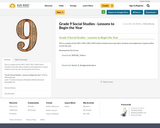
This is a sample unit for IN9.1, IN9.2, IN9.3, IN9.4 which includes lesson plan ideas, handouts and assignments. A great outline to start the year.
Developed by Kim Froese.
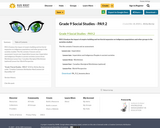
PA9.2 Analyze the impact of empire-building and territorial expansion on indigenous populations and other groups in the societies studied.
This file contains 5 lessons and an assessment:
Lesson one: Imperialism
Lesson two: Imperialism and Indigenous Peoples in ancient societies
Lesson three: Worldviews
Lesson four: Canadian Aboriginal Worldviews (optional)
Lesson five: World Perspective
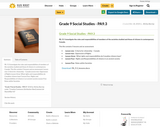
PA. 9.3 Investigate the roles and responsibilities of members of the societies studied and those of citizens in contemporary Canada.
This file contains 5 lessons and an assessment:
Lesson one: Criteria for citizenship – Canada
Lesson two: Oppression of Rights
Lesson three: What rights and responsibilities do Canadian citizens have?
Lesson Four: Rights and Responsibilities of citizens in an ancient society
Lesson Five: Roles within Societies
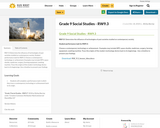
RW 9.3 Determine the influence of technologies of past societies studied on contemporary society.
Student performance task for RW9.3:
Choose a contemporary technology or achievement. Examples may include MP3, space shuttle, medicines, surgery, farming equipment, washing machine. Trace the origins of the modern technology device back to its beginnings. Use a timeline to present your findings.
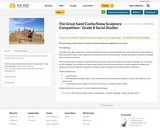
This mini inquiry unity connects to various outcomes explore throughout the curriculum.
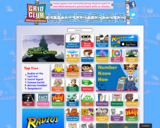
This site offers games galore in math, science, ELA, geography, history, art, design, music, languages, health and more.
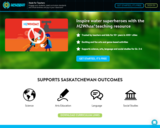
The Planet Protector Academy: H2Whoa! resource teaches students about water conservation and protection and inspires them to take action.
The resource consists of four 60-90 minute lessons that include content developed with Indigenous elders, culture keepers and artists.
Teachers can sign up on this site and get started.
PLUG & PLAY! MINIMAL PREP!
Print Worksheets, Set Up Projector, Let The Website Do The Rest!

The new website for the Heritage Fairs (& High School Heritage Challenge) is now live and ready to accept project submissions for the Virtual Heritage Fair (grades 4-8) and the High School Heritage Challenge (grades 9-12)!
The Heritage Fair program provides the opportunity for students and their families, teachers and communities to learn about diverse Living Heritage projects.
There is still lots of time to prepare and submit a project to these contests, as the deadline is Monday, April 24. The online contests are open to all students in Saskatchewan.
Links to register and submit projects are on the homepage, as well as available in the dropdown menus for each respective contest.
Be sure to check out the Heritage Fairs toolkit that will give you topic inspiration, a list of popular research sources, and a detailed breakdown on how to create your presentation and share your findings. The toolkit is available in both English and French.
Le nouveau site web des Fêtes du patrimoine (et du Défi du patrimoine au secondaire) est maintenant en ligne et prêt à accepter les soumissions de projets pour la Fête du patrimoine virtuelle (niveaux 4 à 8) et le Défi du patrimoine au secondaire (niveaux 9 à 12) !
Le programme des Fêtes du patrimoine offre l'occasion aux élèves et à leurs familles, aux enseignants et aux communautés d'en apprendre davantage sur divers projets de patrimoine vivant.
Il reste encore beaucoup de temps pour préparer et soumettre un projet à ces concours, car la date limite est le lundi 24 avril. Les concours en ligne sont ouverts à tous les élèves en Saskatchewan.
Les liens pour s'inscrire et soumettre des projets se trouvent sur la page d'accueil, ainsi que dans les menus déroulants de chaque concours respectif.
Assurez-vous de consulter la trousse des Fêtes du patrimoine qui vous fournira de l'inspiration pour votre sujet, une liste de sources de recherche populaires et une description détaillée sur la création de votre présentation et le partage de vos résultats. La trousse est disponible en anglais et en français.

"We’re the Canada people; we offer programs that you can use to explore, learn and reflect on our history, and what it means to be Canadian."
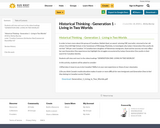
Students will view and react to the video/readings "GENERATION ONE: LIVING IN TWO WORLDS".
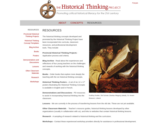
The historical thinking concepts developed and promoted by the Historical Thinking Project have been incorporated into curricula, classroom resources, and professional development tools. They include:
Provincial Historical Thinking Projects - Application process and criteria.
Blog Archive - Read about the experiences and reflections of four young teachers on the challenges and rewards of working with the historical thinking concepts.
Books - Order books that explore more deeply the teaching with the six historical thinking concepts.
Historical Thinking Posters – A set of six 12 x 17" posters illustrating the Historical Thinking Concepts is available in English and in French.
Demonstrations and Discussions - PD resources to assist in incorporating historical thinking into the classroom.
Lessons - We are currently in the process of transferring lessons from the old site. These are not yet available.
Other Classroom Materials - Teacher’s resource guides, historical thinking lessons developed by other organizations (usually in collaboration with us), and links to websites that contain historical thinking lessons.
Research - A sampling of research related to historical thinking and the curriculum.
Workshops - Contact these experienced workshop providers directly for assistance in professional development.
Use of Materials/Copyright
We encourage the use of resources, lessons, and information from our site, but we ask that you credit the Historical Thinking Project for the ideas and materials, by listing our name and our website URL (www.historicalthinking.ca). Fair use of resources does NOT include posting of HTP power points, videos, or other resources on other sites. Use a link to www.historicalthinking.ca instead.
We want historical thinking incorporated into curriculum, classrooms, and educational resources as widely as possible. When you reference the Historical Thinking Project (www.historicalthinking.ca) you are helping us to achieve this goal.
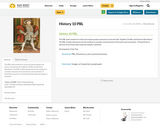
This PBL leads students to study and analyze people and events connected with "English Civil War and Glorious Revolution". The PBL includes disclosures for the students to consider and assessments (formative and summative). A PowerPoint of pictures of the historically important people is attached.
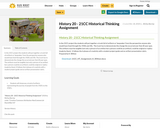
In the 21CC project the students will put together a trunk full of artifacts or ‘keepsakes’ from the perspective anyone who would have lived through the 1920s and 30s. The truck has to demonstrate the change the occurred over that 20 year span. The artifacts must be tangible (not only a picture of an artifact but a picture could be an artifact); could be original or replica (made by them). It follows the 6 phases of creativity with a student project guide and an artifact presentation rubric.
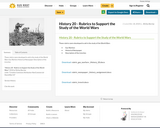
These rubrics were developed to aid in the study of the World Wars
Gas Warfare
Historical Newspaper
Description of the trenches

"Welcome to History for Kids the free online history network. We hope you enjoy and have fun exploring our history.
The website is packed with articles, worksheets and even a quiz on each section.
You will find cool games, videos, worksheets on many historical events that will help you understand those that have gone before us."

3 Levels of Government game
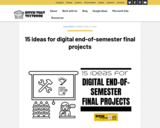
Final projects can help students summarize and review content from the entire semester. Plus, they can create fantastic products with what they've learned!
Projects let students take what they’ve learned, put it all together and show off a little of their own creativity and personality.
Options include:
1. Create a website
2. Create a screencast video
3. Make a single multimedia webpage
4. Connect with a cause
5. Create an infographic
6. Create a series of podcasts
7. Do a genius hour-style project
8. Create an annotated collection
9. Tell it as a story
10. Make an explainer video

This is a cross-curricular unit using the poem "If You're Not from the Prairie".
It includes Grade 4 outcomes for ELA, Arts Ed and Social Studies.
Created by Danielle Jamieson

This site offers a wide range of FNMI resources for grades K-12.